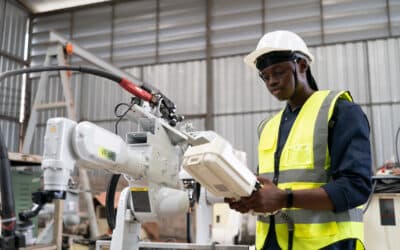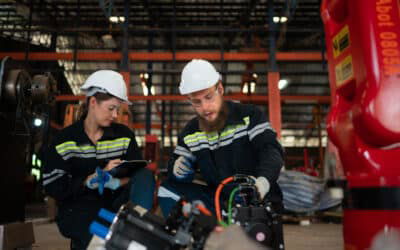L’industrie 4.0 marque une étape décisive dans l’évolution industrielle. Elle intègre des technologies de pointe pour optimiser les processus de production, reliant les machines, les données et les humains. Cette transformation touche tous les aspects de l’usine, avec des implications profondes pour l’entreprise, ses clients et la manière dont les produits sont conçus, fabriqués et livrés. Mais quelles sont les technologies et les avantages de cette nouvelle révolution industrielle ? Voyons cela de plus près.
Introduction à l’industrie 4.0
L’industrie 4.0 repose sur l’intégration des systèmes cyber-physiques, de l’internet des objets et de l’intelligence artificielle dans les chaînes de production. Ce modèle innovant permet une automatisation avancée et une communication en temps réel entre les machines et les humains, optimisant ainsi la productivité, la qualité et la flexibilité des usines. Les entreprises adoptent progressivement ces technologies pour rester compétitives dans un marché en pleine transformation.
Définition et origine du concept
Le terme “industrie 4.0” a été introduit lors de la foire de Hanovre en 2011. Il désigne la convergence entre le monde physique et le monde numérique à travers des systèmes interconnectés. Ces technologies permettent de collecter, analyser et utiliser des données en temps réel afin d’améliorer les processus de production. L’idée est d’optimiser chaque étape de la chaîne de fabrication en connectant toutes les ressources disponibles : machines, humains, et produits.
Les grandes révolutions industrielles menant à l’industrie 4.0
L’industrie a connu quatre grandes révolutions : la première avec la machine à vapeur, la seconde avec l’électricité, la troisième avec l’informatique et l’automatisation, et enfin l’industrie 4.0. Cette dernière pousse l’automatisation à son apogée, en connectant les systèmes de production via des réseaux intelligents. Chaque étape a profondément modifié la manière de produire et de consommer, l’industrie 4.0 étant la plus avancée.
Les technologies clés de l’industrie 4.0
L’industrie 4.0 s’appuie sur un ensemble de technologies qui transforment les usines en environnements intelligents. Ces technologies permettent une production plus agile et personnalisée, en intégrant des outils comme l’internet des objets, la robotique avancée, l’intelligence artificielle et les systèmes cyber-physiques. Cette transformation affecte tous les aspects de la chaîne de production, des machines aux humains, jusqu’aux produits et clients.
Que sont les technologies 4.0 ?
Les technologies 4.0 regroupent l’internet des objets, la robotique collaborative, le cloud computing, l’intelligence artificielle, et les systèmes cyber-physiques. Elles permettent de connecter les machines, les outils et les humains via des réseaux intelligents. Cela améliore l’échange d’informations et facilite la prise de décision en temps réel dans les usines. Ces innovations conduisent à des gains de productivité importants et une flexibilité accrue dans les processus de fabrication.
Les composants essentiels de l’industrie 4.0
Les composants clés incluent les capteurs intelligents, l’internet des objets (IoT), les robots collaboratifs et l’intelligence artificielle. Ces outils permettent de recueillir des données précises sur chaque étape du processus de production. Ces données sont ensuite analysées pour optimiser la gestion des ressources, améliorer la maintenance prédictive des machines, et assurer une production flexible, répondant aux demandes variables des clients.
Quelles applications pour l’industrie 4.0 ?
L’industrie 4.0 s’applique dans des domaines variés : la gestion de la maintenance prédictive, la production en temps réel, l’optimisation de la chaîne logistique, et la personnalisation des produits. Les entreprises peuvent offrir des services plus réactifs, réduire les temps d’arrêt grâce aux données collectées, et améliorer leur productivité. Ces avancées apportent également des solutions pour répondre aux attentes des clients, tout en offrant des produits sur mesure.
Avantages de l’industrie 4.0
Les bénéfices de l’industrie 4.0 sont multiples : elle améliore la réactivité des entreprises, optimise les processus, et ouvre la voie à une production plus agile et personnalisée. En intégrant des systèmes intelligents, les usines peuvent mieux anticiper les pannes, améliorer la gestion des ressources, et offrir des produits de qualité supérieure tout en réduisant les coûts de production.
Amélioration de la productivité et de la flexibilité
Grâce aux technologies de l’industrie 4.0, les entreprises bénéficient d’une meilleure productivité en automatisant une grande partie des processus. La flexibilité accrue permet de s’adapter rapidement aux changements de la demande, en offrant des produits personnalisés ou en ajustant les volumes de production. Cette souplesse devient un atout essentiel dans un marché en constante évolution.
Économies potentielles et amélioration de la qualité de production
L’industrie 4.0 permet de réaliser des économies en optimisant l’utilisation des ressources et en réduisant les temps d’arrêt des machines grâce à une maintenance prédictive. De plus, la précision offerte par les technologies numériques assure une amélioration continue de la qualité des produits, réduisant ainsi les défauts et les reprises. Ces gains en efficacité et en qualité se traduisent par une augmentation de la productivité et une meilleure satisfaction des clients.
Comment intégrer l’industrie 4.0 dans les opérations existantes ?
L’intégration de l’industrie 4.0 dans les opérations existantes nécessite une approche stratégique. Moderniser les usines et les processus de production est une révolution qui implique l’utilisation des nouvelles technologies et des systèmes intelligents pour automatiser et optimiser les chaînes de fabrication. Cette transformation permet aux entreprises de rester compétitives tout en améliorant la productivité et en offrant des produits de meilleure qualité. Voyons comment mettre en place cette évolution.
Stratégies pour moderniser les installations et processus
Les entreprises doivent d’abord évaluer leurs installations existantes et identifier les domaines où les technologies de l’industrie 4.0 peuvent être introduites. Cela passe par l’automatisation des machines, la collecte de données en temps réel, et la mise en place de systèmes intelligents pour surveiller et optimiser les processus. L’internet des objets (IoT) et les outils d’intelligence artificielle jouent un rôle clé dans cette modernisation en offrant des solutions pour améliorer la communication et la gestion des ressources.
Gestion des coûts et complexité de la transition
L’intégration de l’industrie 4.0 implique des coûts initiaux liés à l’acquisition de nouvelles technologies, à la formation des équipes et à la réorganisation des usines. La gestion de cette transition nécessite une planification minutieuse pour éviter des interruptions de production. Toutefois, les économies à long terme, notamment via la maintenance prédictive des machines, l’amélioration de la productivité et la réduction des déchets, compensent ces investissements. Les entreprises doivent adopter une approche progressive pour maîtriser la complexité de cette transformation.
Enjeux et perspectives pour l’avenir
L’industrie 4.0 représente l’avenir de la production industrielle, mais elle pose aussi des défis. Alors que les usines se transforment pour devenir plus intelligentes et connectées, les entreprises doivent s’adapter à un environnement en perpétuelle évolution. Les technologies émergentes changent les attentes des clients et la manière dont les produits sont conçus et livrés. L’anticipation de ces changements est essentielle pour rester compétitif dans cette nouvelle ère industrielle.
Pourquoi l’industrie 4.0 est-elle essentielle à votre entreprise ?
Adopter l’industrie 4.0 est crucial pour rester compétitif dans un monde en mutation rapide. Les entreprises peuvent offrir des produits plus personnalisés, réduire les coûts et améliorer la satisfaction des clients. En utilisant des données en temps réel pour optimiser les processus, elles deviennent plus réactives et résilientes face aux fluctuations du marché. Cette révolution ouvre la voie à de nouveaux modèles d’affaires basés sur l’internet des objets, les services numériques, et l’intelligence artificielle.
Les évolutions émergentes dans les usines 4.0
Les usines continuent de se transformer avec des innovations telles que la robotique collaborative, l’intelligence artificielle, et les jumeaux numériques. Ces technologies permettent une gestion en temps réel de la chaîne de production et une utilisation optimisée des ressources. De plus, des avancées comme la maintenance prédictive des machines et l’amélioration continue des systèmes de communication changent la manière dont les humains interagissent avec la technologie, facilitant la prise de décisions rapides et efficaces.
Comment l’industrie française peut-elle s’adapter à l’usine 4.0 ?
L’industrie française doit investir dans les nouvelles technologies et adapter ses usines pour tirer parti des avantages de l’industrie 4.0. Cela inclut l’amélioration des compétences des travailleurs pour qu’ils maîtrisent les outils numériques et collaborent avec les machines intelligentes. La gestion des données et des réseaux interconnectés devient essentielle pour améliorer la productivité et la compétitivité. En s’appuyant sur des politiques de soutien à l’innovation, l’industrie française peut réussir cette transformation vers l’usine du futur.
Restez connecté :
Pour ne rien manquer de l’actualité de TEEPTRAK et de l’industrie 4.0, suivez nous sur LinkedIn et YouTube. Inscrivez-vous également à notre newsletter pour recevoir le récap mensuel !
Ceci pourrait également vous intéresser :





0 Comments